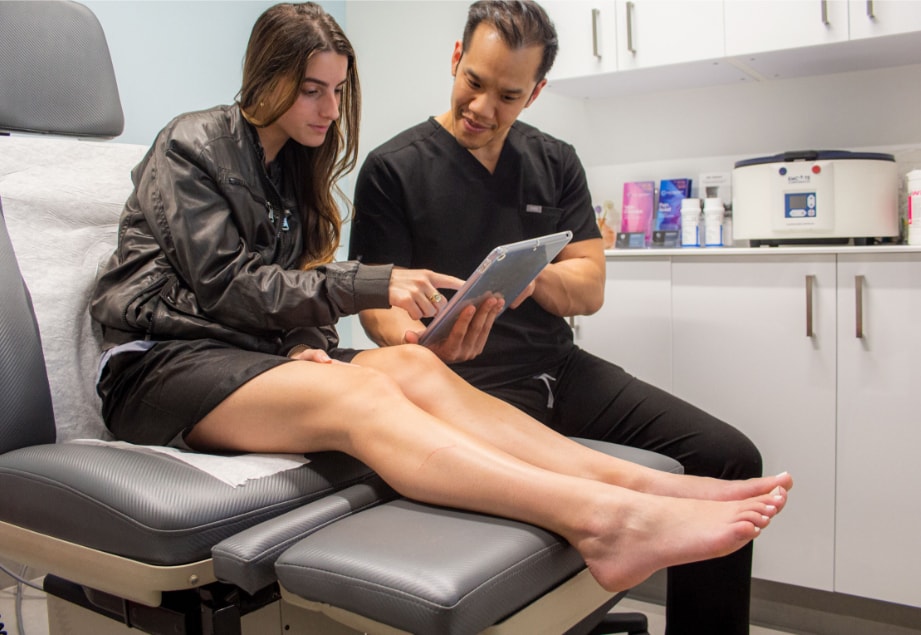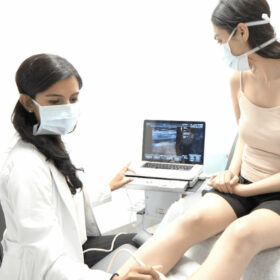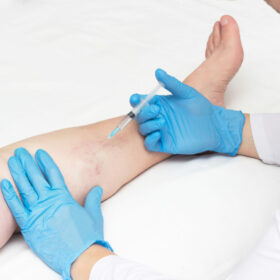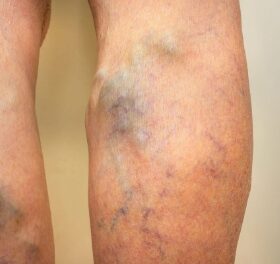How dangerous is venous insufficiency?
Venous insufficiency is a condition in which veins cannot carry enough blood to the heart due to weakened valves or abnormal veins. It is a serious medical condition and can lead to significant health complications if not treated properly.
Chronic venous insufficiency (CVI) occurs when the veins in the legs cannot pump enough deoxygenated blood back to the heart. This leads to the accumulation of blood in the lower legs, resulting in swelling and pain. The symptoms of CVI depend on its severity and may include swelling, pain, aching, cramping, heaviness in the legs, varicose veins, or skin discoloration. Left untreated, it can lead to more serious long-term complications, such as skin damage, leg ulcers and infections, and potentially life-threatening blood clots.
It’s important to note that venous insufficiency can be managed with lifestyle changes and medical treatment. Regular exercise, elevating the legs, wearing compression stockings, avoiding sitting or standing for long periods, and losing weight can improve circulation and reduce the severity of symptoms. However, the only way to treat venous insufficiency and prevent it from worsening is with minimally invasive vein treatments, such as radiofrequency ablation, laser ablation, and VenaSeal.
Vein Treatment Clinic is a group of state-of-the-art medical centers specializing in minimally invasive spider vein and varicose vein treatments. Our vein clinics are located in New York, New Jersey, California, Maryland, and other parts of the US. Furthermore, all our vein treatment clinics are led by board-certified vein doctors who diagnose and treat the root cause of vein disease, not just the symptoms. If you’re in New York, you can find our vein center in Midtown Manhattan or the Financial District, a short walk from Seaport.
Please schedule an appointment at your nearest vein treatment clinic today.
What is CVI in medical terms?
Chronic venous insufficiency (CVI) refers to a range of conditions that occur when the valves in the veins of the legs fail to work properly and prevent the return of blood to the heart. When these valves become damaged, it’s harder for the blood to flow toward the heart because gravity forces blood to flow backward. The accumulation of blood in leg veins leads to aches and pains in the legs, swelling and discoloration of the skin, spider veins, varicose veins, and other symptoms.
Are varicose veins reversible?
Varicose veins can be a source of discomfort and embarrassment, but the good news is they’re completely treatable. Varicose veins can’t be completely reversed, but lifestyle changes and minimally invasive treatments can manage the symptoms and address the underlying problem.
First, it’s important to understand that varicose veins are caused by chronic venous insufficiency, a condition wherein the collapse of vein valves leads to the accumulation of blood in leg veins. The continued accumulation of blood leads to vascular dilation and the eventual formation of varicose veins. There’s no way to reverse varicose veins because the damaged vein valves can’t be fixed with lifestyle changes or medical intervention. However, certain lifestyle changes can reduce the symptoms and improve blood flow to the heart.
Wearing compression stockings, exercising regularly, and avoiding long periods of sitting or standing can relieve the symptoms of varicose veins. You can also engage in exercises that engage your calf muscles, thus pushing some of the accumulated blood to the heart. These lifestyle changes won’t fix the damaged vein valves, so more blood will continue accumulating in your leg veins, but they can alleviate the worst symptoms. The only way to remove varicose veins completely is with minimally invasive procedures, such as ambulatory phlebectomy.
Please visit your nearest vein treatment clinic to explore your varicose vein treatments.
How to diagnose varicose veins?
Duplex ultrasound is a non-invasive imaging test that uses sound waves to generate images of the veins and arteries in your legs. During the procedure, a small probe is held above the area being studied, sending high-frequency sound waves through the skin. These sound waves create pictures that help doctors visualize the structure and movement of the veins in your legs. By looking at these pictures, a vein doctor can diagnose the presence of varicose veins and make recommendations for treatment.
Duplex ultrasound is a safe, effective, and painless procedure to diagnose varicose veins and chronic venous insufficiency. If you have the symptoms of venous insufficiency or want to see if you have varicose veins, talk to your vein doctor today.
Do varicose veins cause high blood pressure?
No, varicose veins do not cause high blood pressure. Varicose veins are enlarged, twisted veins caused by weakened valves that allow blood to flow back and collect in certain areas. On the other hand, high blood pressure is caused by a buildup of pressure in your arteries as your heart pumps blood through your body. While varicose veins can be a symptom of other medical problems, like pregnancy and obesity, they are not associated with high blood pressure.
What are the best treatments for venous insufficiency?
If you are suffering from venous insufficiency, there are three main treatments available to you: radiofrequency ablation, endovenous laser ablation, and Venaseal. Radiofrequency ablation is a minimally-invasive procedure that involves using a radiofrequency current to seal off faulty veins. Endovenous laser ablation relies on laser energy to heat and seal the veins. Finally, Venaseal is a non-thermal adhesive that directly seals the vein shut. All three treatments are minimally-invasive and performed in a vein doctor’s office, so you don’t need to worry about a long and uncomfortable recovery time.












